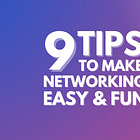Why the removal of the Commission's staff on the EU Whoiswho directory is an opportunity for EU lobbyists
The European Commission's decision to remove contact details of its staff on the EU WhoisWho directory can benefit Brussels lobbyists by clarifying their priorities, developing their expertise...
The recent decision by the European Commission to remove the contact details of its staff on the EU WhoisWho directory has made quite the uproar in the public affairs sphere.
Many lobbyists complain about the reduction of transparency and ease of access, which made our jobs overall more difficult.
And yet—stay with me—I feel like this move can be beneficial for Brussels lobbyists and the public affairs sector. Here’s how YOU can benefit from it.

It forces lobbyists to clarify their priorities
Now that we don’t have access to all the civil servants at the Commission, we have to be selective in how we approach policymakers.
Instead of pestering the rank-and-file officers, we now have to think carefully about when and how to address a top-ranking manager (heads of units and above). Now, we are not competing only with our counterparts for the attention of one civil servant for one specific file. We are now fighting for top officials’ consideration over a multitude of files.
One solution: get your priorities straight. Instead of reaching out to the Commission every day for minute information, we will have to do our own research and analysis better before we pick up the phone. And once we do, we have to be thoughtful in our questions and requests.
Is that a problem? Not for those who will cultivate the effort of defining their strategy better. It might actually be a chance. To understand why, let’s step up to point two.
Lobbyists’ expertise will be much more sought for
You can offer something to lawmakers that they don’t have: your expertise.
Sure, Commission staff members know a great deal about the topic they are responsible for. But you have privileged contact with the industry, and the key players of your field, whether you are an in-house policy manager, consultant, or working for an NGO. You have the figures, the experience of the field, the narrative.
This kind of information is invaluable for policymakers. If you play your cards well, Commission officials will encourage, welcome, and perhaps even look for your suggestions and ideas.
The Commission’s decision to remove its staff from the Whoiswho register is good news: now it’s your time to shine. You don’t have contacts anymore? no problem: make sure you are seen as an expert, bring valuable insights to the negotiation table, and be thoughtful about the arguments you present.
Once again, those who are prepared have nothing to fear. The others can learn.
Do you want to develop your skills and expertise in EU advocacy and lobbying? Then why don’t you subscribe to The Beubble, the public affairs toolkit newsletter? It’s free.
Thoughtful networking becomes a valuable skill
Now that the lower-ranking personnel is gone from the publically-accessible contact lists, those who took the time and effort to cultivate personal contact have a competitive edge.
Instead of picking up the phone or drafting a quick email to your usual contact at the Commission, you have to go to the top management. Your objective now will be to cherish and nurture relationships with the institution.
Networking is an important aspect of lobbying. It has just become more important than ever. If you need advice on how to make it easier and more fun, check out our last piece on the topic. ⬇️
Now, I’m curious to hear about what you think of the Commission’s decision to remove its staff from the EU Whoiswho directory. Do you think it undermines transparency? Do you feel an impact on your job? Leave a comment in the section and let’s start the conversation.





